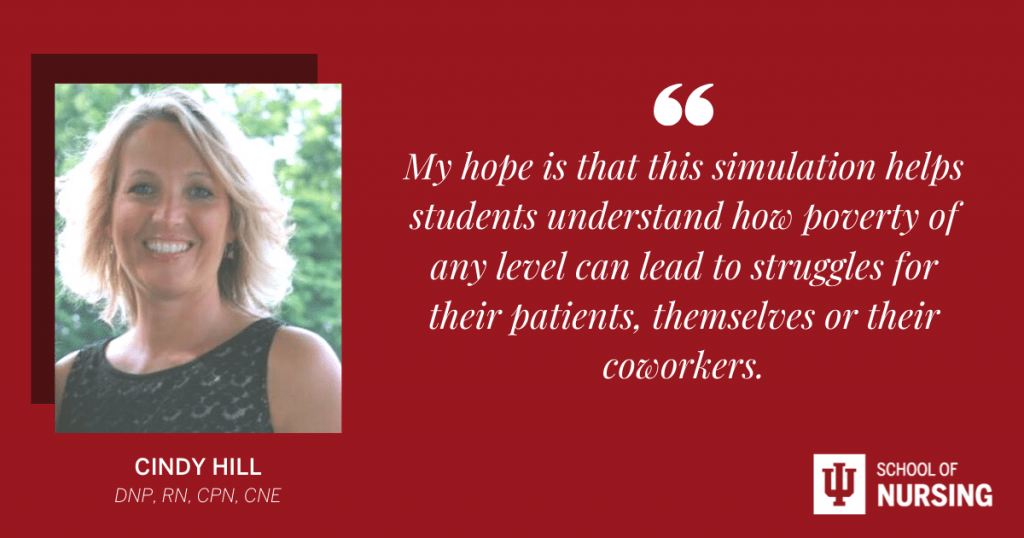An interactive approach to learning about poverty is giving IU School of Nursing students a better understanding of the tough choices that many patients face every day.
The experience begins in the first semester of nursing school when clinical assistant professor Dr. Cindy Hill invites her students to take part in a live-action poverty simulation.
"The simulation framework is inclusive and represents what these future nurses will see working in healthcare," says Hill.
The simulation, designed by the Community Action Poverty Simulation (CAPS), organizes students into families and provides cards that describe their unique circumstances. Students are tasked with providing food, shelter and other necessities for their families while facing various challenges. The simulation uses 15-minute intervals to represent four weeks of life.
"We ask them to work together as a family unit to solve problems," says Hill. "Typically, there is a sense of pride in what they accomplish, but they will also say, 'This was hard. I waited in line to pay a bill, and by the time I got there, my time was up.'"
Hill says the simulation not only opens their eyes to the realities of poverty but also how communities can and do come together to support each other through hard times.
"I've had students come to the aid of others during the simulation and say, 'We can help you. We're home, so we can watch your child - or here's $10 to buy transportation passes.' They realize what it is to have a helping hand and to help your neighbor."
In this way, the simulation is accomplishing precisely what CAPS designed it to do: help participants develop empathy and understanding for those experiencing poverty, a patient struggle the United Nations suggests nurses around the globe are all but guaranteed to encounter.
In 2015, all member UN states adopted an agenda for sustainable development, which provides a blueprint for peace and prosperity for people and the planet - now and into the future. At its heart are 17 Sustainable Development Goals, the first of which is to "end poverty in all its forms everywhere."
Unfortunately, the UN says the COVID-19 pandemic has led to the first rise in extreme poverty in a generation. It states approximately 120 million people worldwide were pushed back into extreme poverty in 2020.
"My hope is that this simulation helps students understand how poverty of any level can lead to struggles for their patients, themselves or their coworkers," says Hill.
My hope is that this simulation helps students understand how poverty of any level can lead to struggles for their patients, themselves or their coworkers.”
"They might be giving discharge instructions that say, 'You need to take this medicine and go to physical therapy,' but in reality, that patient can't afford to purchase the medicine or buy the gas to drive to therapy," she continues.
As the simulation helps students expand their understanding of these concepts, it also introduces them to critical community resources and how to access them.
"I think that's one of the biggest benefits for future nurses," says Hill. "As they gain an understanding of a patient's needs, they can connect them to the appropriate resources."
"Whenever we talk about poverty and how we can decrease it, I think it just makes you more aware of what those around you are going through," she says.
Resources are also available to help current IUSON students struggling with personal or financial hardships. Students in need are encouraged to reach out to their academic advisor and visit the Help Me R.O.A.R. website, a one-stop shop for information and resources.


